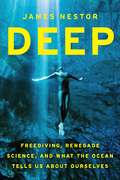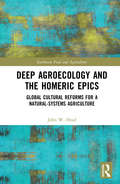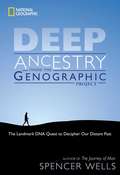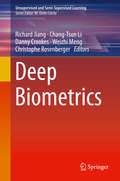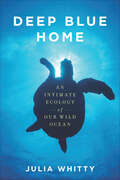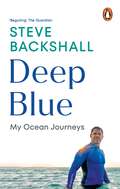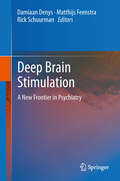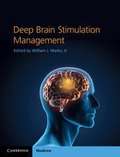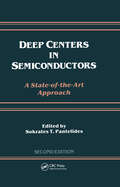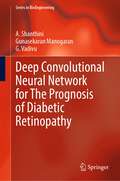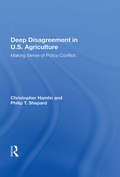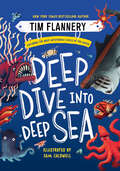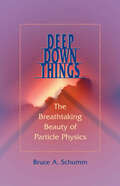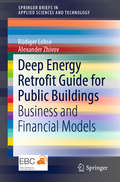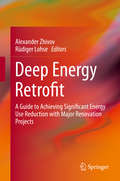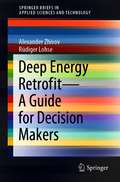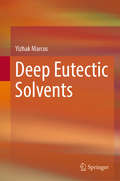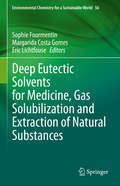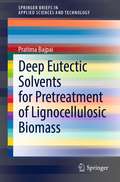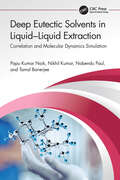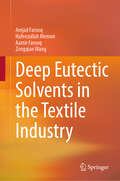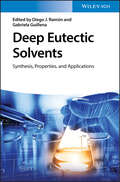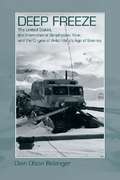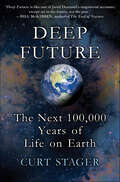- Table View
- List View
Deep
by James NestorWhile on assignment in Greece, journalist James Nestor witnessed something that confounded him: a man diving 300 feet below the ocean's surface on a single breath of air and returning four minutes later, unharmed and smiling.This man was a freediver, and his amphibious abilities inspired Nestor to seek out the secrets of this little-known discipline. In Deep, Nestor embeds with a gang of extreme athletes and renegade researchers who are transforming not only our knowledge of the planet and its creatures, but also our understanding of the human body and mind. Along the way, he takes us from the surface to the Atlantic's greatest depths, some 28,000 feet below sea level. He finds whales that communicate with other whales hundreds of miles away, sharks that swim in unerringly straight lines through pitch-black waters, and seals who dive to depths below 2,400 feet for up to eighty minutes--deeper and longer than scientists ever thought possible. As strange as these phenomena are, they are reflections of our own species' remarkable, and often hidden, potential--including echolocation, directional sense, and the profound physiological changes we undergo when underwater. Most illuminating of all, Nestor unlocks his own freediving skills as he communes with the pioneers who are expanding our definition of what is possible in the natural world, and in ourselves.
Deep Agroecology and the Homeric Epics: Global Cultural Reforms for a Natural-Systems Agriculture (Earthscan Food and Agriculture)
by John W. HeadDrawing on the Homeric epics, this multidisciplinary work reveals the cultural transformations which need to take place in order to transition from today’s modern extractive agricultural system to a sustainable natural‐systems agriculture. In order to provide an imaginative foundation on which to build such a cultural transformation, the author draws on the oldest and most pervasive pair of literary works in the Western canon: the Iliad and the Odyssey. He uses themes from those foundational literary works to critique the concept of state sovereignty and to explain how innovative federalism structures around the world already show momentum building toward changes in global environmental governance. The book proposes a dramatic expansion on those innovations, to create eco‐states responsible for agroecological management. Drawing from many years of experience in international institutions, the author proposes a system of coordination by which an international agroecology‐focused organization would simultaneously (i) avoid the shortcomings of the world’s current family of powerful global institutions and (ii) help create and implement a reformed system of local landscape‐based agriculture wholly consistent with ecological principles. Acknowledging the difficulty of achieving reforms such as these, the author suggests that a new cultural‐conceptual narrative can be constructed drawing on values set forth 2,700 years ago in the Homeric epics. He explains how these values can be reimagined to drive forward our efforts in addressing today’s the climate and agricultural crises in ways that reflect, not reject, the natural processes and relationships that make the Earth a living planet. This book will be of great interest to students, academics and policymakers addressing issues of agrarian values, environmental and agricultural law, environmental restoration, agroecology, and global institutional reform.
Deep Ancestry: Inside the Genographic Project
by Spencer WellsLaunched in 2005, the Genographic Project is the largest genetic study of human migration ever mounted. In this accessible text, Project Director and National Geographic Explorer-in-Residence Spencer Wells provides an overview of what is understood so far and describes what scientists hope to learn as the project progresses. He uses the stories of five individual program participants as examples for explaining how historical details are gleaned from DNA and exploring the larger issues involved in the research. Annotation ©2007 Book News, Inc., Portland, OR (booknews.com)
Deep Biometrics (Unsupervised and Semi-Supervised Learning)
by Richard Jiang Danny Crookes Chang-Tsun Li Weizhi Meng Christophe RosenbergerThis book highlights new advances in biometrics using deep learning toward deeper and wider background, deeming it “Deep Biometrics”. The book aims to highlight recent developments in biometrics using semi-supervised and unsupervised methods such as Deep Neural Networks, Deep Stacked Autoencoder, Convolutional Neural Networks, Generative Adversary Networks, and so on. The contributors demonstrate the power of deep learning techniques in the emerging new areas such as privacy and security issues, cancellable biometrics, soft biometrics, smart cities, big biometric data, biometric banking, medical biometrics, healthcare biometrics, and biometric genetics, etc. The goal of this volume is to summarize the recent advances in using Deep Learning in the area of biometric security and privacy toward deeper and wider applications.Highlights the impact of deep learning over the field of biometrics in a wide area;Exploits the deeper and wider background of biometrics, such as privacy versus security, biometric big data, biometric genetics, and biometric diagnosis, etc.;Introduces new biometric applications such as biometric banking, internet of things, cloud computing, and medical biometrics.
Deep Blue Home: An Intimate Ecology of Our Wild Ocean
by Julia Whitty“A lovely, soft-spoken book about the ‘joy, inspiration, wonder, laughter, ideas’ that come from relating to Earth’s ‘nonhuman world.’”—Kirkus Review“Here is a writer of power and persuasion; one worthy of the Rachel Carson mantle. Whitty allows us to peer into the ecological web of the mysterious World Ocean, sharing her passion for the continuation of the ocean's life-essential fabric.”—Linda Lear, author of Rachel Carson: Witness for Nature “Rhythmic, poetic, transporting, and illuminating, this is the sacred memoir of a woman among islands of miracles, yearning with all her heart to be right where she is.”—Carl Safina, author of Song for the Blue Ocean, The View From Lazy Point“An illuminating exploration of the swirling currents connecting oceans, science, people, and history, bearing the reader on a unique voyage of discovery above and below the waves.”—Daniel Bennett, President of The Explorers Club —
Deep Blue: My Ocean Journeys
by Steve BackshallTake a deep breathSteve Backshall was nine years old the first time he saw a shark, while on holiday with his family in Malaysia. It was the beginning of a life-long fascination with these 'lords of the sea', and the oceanic life around them. His career as one of the world's most popular naturalists and explorers has taken him to countless underwater places, many never before seen by others. And he's also been witness to the startling decline in fortune of our oceans' wild inhabitants over the past fifty years.Deep Blue is a book a lifetime in the making: a remarkable blend of memoir, travel, and marine and environmental science that takes us on an unforgettable tour of the many worlds of aquatic life: from underwater deserts and rainforests to the evolution of ocean heroes like the sea turtle and the Great White, from the genesis of ocean life to the rapidly declining state of white polar seas and coral reefs. It's both a love letter to our precious oceans and rallying cry for what we must to do save them.
Deep Brain Stimulation
by Rick Schuurman Matthijs Feenstra Damiaan DenysDeep Brain Stimulation: A New Frontier in Psychiatry provides an overview of current developments and the future possibilities of deep brain stimulation for patients with therapy-refractory psychiatric disorders. The side-by-side presentation of clinical applications and animal research provides a truly translational approach. Also included is a special chapter on the ethical issues involved in deep brain stimulation in psychiatry. Deep brain stimulation of selected brain areas has been shown to result in a substantial improvement of symptoms and quality of life in patients suffering from obsessive-compulsive disorder, major depressive disorder and drug addiction. Although it is still an experimental therapy and the number of psychiatric patients that are treated is low, its effectiveness and safety makes deep brain stimulation the most promising therapy for treating other serious and life-threatening psychiatric conditions.
Deep Brain Stimulation Management
by William J. Marks Jr."Deep Brain Stimulation Management is a practical guide to the use of this paradigm-shifting therapy for movement disorders, including Parkinson's disease, essential tremor, and dystonia. This title is an essential resource for clinicians who wish to begin utilizing DBS, as well as current practitioners seeking to improve their understanding and application of the technique. Highly illustrated and in full color throughout, this comprehensive book covers the key aspects of DBS practice, including patient selection, device programming and activation to achieve optimum symptom control, long-term management, and troubleshooting. With contributions from some of the most experienced clinical leaders in the field of DBS and extremely practical content, this is an essential reference text for any clinician working with DBS patients"--Provided by publisher.
Deep Centers in Semiconductors
by Sokrates T. PantelidesExamines several key semiconductor deep centers, all carefully chosen to illustrate a variety of essential concepts. A deep center is a lattice defect or impurity that causes very localized bound states and energies deep in the band gap. For each deep center chosen, a scientist instrumental in its development discusses the theoretical and experimental techniques used to understand that center. The second edition contains four new sections treating recent developments, including a chapter on hydrogen in crystalline semiconductors.
Deep Convolutional Neural Network for The Prognosis of Diabetic Retinopathy (Series in BioEngineering)
by G. Vadivu Gunasekaran Manogaran A. ShanthiniThis book discusses a detailed overview of diabetic retinopathy, symptoms, causes, and screening methodologies. Using a deep convolution neural network and visualizations techniques, this work develops a prognosis system used to automatically detect the diabetic retinopathy disease from captured retina images and help improve the prediction rate of diagnosis. This book gives the readers an understanding of the diabetic retinopathy disease and recognition process that helps to improve the clinical analysis efficiency. It caters to general ophthalmologists and optometrists, diabetologists, and internists who encounter diabetic patients and most prevalent retinal diseases daily.
Deep Disagreement In U.s. Agriculture: Making Sense Of Policy Conflict
by Christopher HamlinThis book exemplifies disagreements in agricultural research and agricultural policies in the U.S. It hopes to expand the capacity for critical discussion on matters of agriculture and attempts to open a path to more fruitful communication among participants in agricultural controversy.
Deep Dive into Deep Sea: Exploring The Most Mysterious Levels Of The Ocean
by Tim FlanneryInternationally renowned author and scientist Tim Flannery explores the most remote and mysterious levels of Earth’s oceans. Who is the giant squid’s mortal enemy? Can you see ghosts in the deep sea? What in the world is a headless chicken monster? Tim Flannery has the answers. In this informed and accessible book, he takes readers on a journey into the darkest depths of this unchartered realm to learn about the incredible creatures living there. Divided into sections that focus on the various depths of the ocean, readers can navigate their way through the sea while being guided by anecdotes from Tim’s own personal experiences. From hairy sea devils and goblin sharks to entire ecosystems within whale carcasses, he uncovers fascinating and bizarre facts about this enchanting place and the slippery, scaly, and strange creatures that live there. Packed with vibrant illustrations and snappy engaging text, Deep Dive into Deep Sea will enthrall, enlighten, and capture the imaginations and passions of young oceanographers.
Deep Down Things: The Breathtaking Beauty of Particle Physics
by Bruce A. SchummA useful scientific theory, claimed Einstein, must be explicable to any intelligent person. In Deep Down Things, experimental particle physicist Bruce Schumm has taken this dictum to heart, providing in clear, straightforward prose an elucidation of the Standard Model of particle physics—a theory that stands as one of the crowning achievements of twentieth-century science. In this one-of-a-kind book, the work of many of the past century's most notable physicists, including Einstein, Schrodinger, Heisenberg, Dirac, Feynman, Gell-Mann, and Weinberg, is knit together in a thorough and accessible exposition of the revolutionary notions that underlie our current view of the fundamental nature of the physical world. Schumm, who has spent much of his life emmersed in the subatomic world, goes far beyond a mere presentation of the "building blocks" of matter, bringing to life the remarkable connection between the ivory tower world of the abstract mathematician and the day-to-day, life-enabling properties of the natural world. Schumm leaves us with an insight into the profound open questions of particle physics, setting the stage for understanding the progress the field is poised to make over the next decade or two.Introducing readers to the world of particle physics, Deep Down Things opens new realms within which are many clues to unraveling the mysteries of the universe.
Deep Down and Other Extreme Places to Live
by Shirin Yim BridgesA short book about extreme animal habitats.
Deep Energy Retrofit Guide for Public Buildings: Business and Financial Models (SpringerBriefs in Applied Sciences and Technology)
by Rüdiger Lohse Alexander ZhivovThis book provides detailed information on how to set up Deep Energy Retrofits (DERs) in public buildings, and shares in-depth insights into the current status of the major technologies, strategies and practical best practice examples of how to cost-effectively combine them. Case studies from Europe are analyzed with respect to energy use before and after renovation, reasons for undertaking the renovation, co-benefits achieved, resulting cost-effectiveness, and the business models employed. The building sector holds the potential for tremendous improvements in terms of energy efficiency and reducing carbon emissions, and energy retrofits to the existing building stock represent a significant opportunity in the transition to a low-carbon future. Moreover, investing in highly efficient building materials and systems can replace long-term energy imports, contribute to cost cutting, and create a wealth of new jobs. Yet, while the technologies needed in order to improve energy efficiency are readily available, significant progress has not yet been made, and “best practices” for implementing building technologies and renewable energy sources are still relegated to small “niche” applications. Offering essential information on Deep Energy Retrofits, the book offers a valuable asset for architects, public authorities, project developers, and engineers alike.
Deep Energy Retrofit: A Guide to Achieving Significant Energy Use Reduction with Major Renovation Projects (Springerbriefs In Applied Sciences And Technology Ser.)
by Rüdiger Lohse Alexander ZhivovThis book provides detailed information on how to set up Deep Energy Retrofits (DERs) in public buildings, and shares in-depth insights into the current status of the major technologies, strategies and best practice examples of how to cost-effectively combine them. Case studies from the U.S.A. and Europe show that that Deep Energy Retrofit can be achieved with a limited core technologies bundle readily available on the market. Characteristics of some of these core technology measures depend on the technologies available on an individual nation’s market, on the minimum requirements of national standards, and on economics (as determined by a life cycle cost analysis). Also, requirements to building envelope-related technologies (e.g., insulation levels, windows, vapor and water barriers, and requirements for building airtightness) depend on specific climate conditions. This Guide provides best practice examples of how to apply these technologies in different construction situations.High levels of energy use reduction using core technology bundles along with improvements in indoor climate and thermal comfort can be only achieved when a Deep Energy Retrofit adopts a quality assurance process. In addition to design, construction, commissioning, and post-occupancy phases of the quality assurance process, the Guide emphasizes the importance of clearly and concisely formulating and documenting the Owner’s goals, expectations, and requirements for the renovated building during development of the statement of work. Another important component of the quality assurance process is a procurement phase, during which bidders’ qualifications, their understanding of the scope of work and its requirements, and their previous experience are analyzed.The building sector holds the potential for tremendous improvements in terms of energy efficiency and reducing carbon emissions, and energy retrofits to the existing building stock represent a significant opportunity in the transition to a low-carbon future. Moreover, investing in highly efficient building materials and systems can replace long-term energy imports, contribute to cost cutting, and create a wealth of new jobs. Yet, while the technologies needed in order to improve energy efficiency are readily available, significant progress has not yet been made, and “best practices” for implementing building technologies and renewable energy sources are still relegated to small “niche” applications.Offering essential information on Deep Energy Retrofits, the book offers a valuable asset for architects, public authorities, project developers, and engineers alike.
Deep Energy Retrofit—A Guide for Decision Makers (SpringerBriefs in Applied Sciences and Technology)
by Rüdiger Lohse Alexander ZhivovMany governments worldwide are setting more stringent targets for reductions in energy use in government/public buildings. Buildings constructed more than 10 years ago account for a major share of energy used by the building stock. However, the funding and “know-how” (applied knowledge) available for owner-directed energy retrofit projects has not kept pace with new requirements. With typical retrofit projects, reduction of energy use varies between 10 and 20%, while actual executed renovation projects show that energy use reduction can exceed 50%, and can cost-effectively achieve the Passive House standard or even approach net zero-energy status (EBC Annex 61 2017a, Hermelink and Müller 2010; NBI 2014; RICS 2013; Shonder and Nasseri 2015; Miller and Higgins 2015; Emmerich et al. 2011).Building energy efficiency (EE) ranks first in approaches with resource efficiency potential with a total resource benefit of approximately $700 billion until 2030. EE is by far the cheapest way to cut CO2 emissions (McKinsey 2011, IPCC 2007). However, according to an IEA study (IEA 2014a), more than 80% of savings potential in building sector remains untapped. Thus, the share of deployed EE in the building sector is lower than in the Industry, Transport, and Energy generation sectors. Estimates for the deep renovation potentials show: €600-900bn investment potential, €1000-1300bn savings potential, 70% energy-saving potential, and 90% CO2 reduction potential.
Deep Eutectic Solvents
by Yizhak MarcusThis is one of the first books fully dedicated to the rapidly advancing and expanding research area of deep eutectic solvents. Written by the internationally recognized expert in solution chemistry, it supplies full information regarding preparation of these new eco-friendly solvents, their properties and applications. The current and potential applications of deep eutectic solvents as organic reaction media, catalytic system, in biomass processing, nanotechnology and metal finishing industry, as well as for extraction and separation are extensively discussed.This highly informative and carefully presented book will appeal to practicing chemists (organic chemists, polymer chemists, biochemists) as well as chemical engineers and environmental scientists.
Deep Eutectic Solvents for Medicine, Gas Solubilization and Extraction of Natural Substances (Environmental Chemistry for a Sustainable World #56)
by Eric Lichtfouse Sophie Fourmentin Margarida Costa GomesInitially considered as a sub-class of ionic liquids, eutectic mixtures are formed by mixtures of low cost, often biodegradable Lewis or Bronsted acids and bases. Eutectic mixtures have gathered a growing scientific interest by the academic and industrial communities as they are interesting for many applications ranging from metal processing to biomass treatment or pharmaceuticals.This volume gathers contributions by some of the most active research groups in the world using eutectic mixtures for applications in separation, extraction or pharmaceutical and medical applications. The different contributions aim at a large overview of the field for these particular applications by reviewing literature data and presenting ground breaking research in the different fields.
Deep Eutectic Solvents for Pretreatment of Lignocellulosic Biomass (SpringerBriefs in Applied Sciences and Technology)
by Pratima BajpaiThis book focuses on the properties of deep eutectic solvents (DESs) and recent advances in their application in lignocellulosic biomass processing. Lignocellulosic biomass conversion to biofuels, biochemicals and other value-added products has attracted global attention because it is a readily available, inexpensive and renewable resource. However, in order for biomass technologies to be commercially viable, biomass recalcitrance needs to be cost-effectively reduced. Deep eutectic solvents (DESs) are new ‘green' solvents that have the high potential for biomass processing thanks to their low cost, low toxicity, biodegradability, and easy recycling and reuse. After an overview of the current lignocellulosic biomass pretreatment, the book discusses the synthesis and physiochemical properties of DESs, as well as key findings on the effects of DES on cellulose, hemicellulose and lignin solubilization, biomass pretreatment and biomass crystallinity. It then addresses the enzymatic hydrolysis performance of DES-pretreated solids, compatibility of DESs with enzymes and microorganisms, and the recycling potential of DESs. Lastly, it compares DESs with ionic liquids, and examines the challenges and opportunities relating to extending the use of DESs in lignocellulosic processing.
Deep Eutectic Solvents in Liquid-Liquid Extraction: Correlation and Molecular Dynamics Simulation
by Tamal Banerjee Nikhil Kumar Papu Kumar Naik Nabendu PaulDeep eutectic solvents (DESs) are a new class of green solvents that open a whole new world of opportunities for separation challenges. This book comprehensively provides a detailed discussion of their application as an extractive solvent in separation processes, adopting molecular dynamics (MD) simulations for atomistic insight into the solute transfer across bi-phasic systems. Furthermore, it explains ternary and quaternary mixtures, including MD simulation of relevant DES systems. Features in this volume include the following: Applications of DESs in the extraction of aromatics and polyaromatics from fuel oil by liquid–liquid extraction Eutectic behavior with respect to hydrocarbon and aqueous solutions MD insights on extraction using DESs Possible industrial applicability of potential DESs Results from Gaussian, NAMD, and PACKMOL software packages This book is aimed at researchers and graduate students working in the field of fuels and petrochemicals, separation science, chromatography, and chemical processing and design.
Deep Eutectic Solvents in the Textile Industry
by Hafeezullah Memon Amjad Farooq Aamir Farooq Zongqian WangThis book comprehensively explores the fascinating intersection of deep eutectic solvents (DES) and nanocellulose, focusing specifically on their extraction methods and textile applications. It delves into the revolutionary role of deep eutectic solvents in nanocellulose extraction. Deep eutectic solvents are a class of non-toxic, low-cost, and environmentally friendly solvents formed by combining hydrogen bond donors and acceptors. They possess unique properties that make them highly suitable for dissolving cellulose and facilitating nanocellulose extraction with enhanced efficiency and sustainability. The book begins by providing a thorough overview of nanocellulose, its types, properties, and potential applications in the textile industry. It then delves into the fundamentals of deep eutectic solvents, their composition, properties, and synthesis methods. The subsequent chapters focus on the extraction techniques and strategies employed to obtain nanocellulose using deep eutectic solvents, highlighting the advantages and challenges associated with each method. It also discusses the potential modifications and functionalizations of nanocellulose to enhance its compatibility with textile applications, such as surface grafting, blending, and composite formation. The last part of the book shifts its focus to the applications of deep eutectic solvents in the textile industries. It explores the textile materials fibers, yarns, fabrics, and modification and dyeing and highlights the resulting improvements in mechanical strength, moisture management, thermal insulation, and UV protection.
Deep Eutectic Solvents: Synthesis, Properties, and Applications
by Gabriela Guillena Diego J. RamónA useful guide to the fundamentals and applications of deep eutectic solvents Deep Eutectic Solvents contains a comprehensive review of the use of deep eutectic solvents (DESs) as an environmentally benign alternative reaction media for chemical transformations and processes. The contributors cover a range of topics including synthesis, structure, properties, toxicity and biodegradability of DESs. The book also explores myriad applications in various disciplines, such as organic synthesis and (bio)catalysis, electrochemistry, extraction, analytical chemistry, polymerizations, (nano)materials preparation, biomass processing, and gas adsorption. The book is aimed at organic chemists, catalytic chemists, pharmaceutical chemists, biochemists, electrochemists, and others involved in the design of eco-friendly reactions and processes. This important book: -Explores the promise of DESs as an environmentally benign alternative to hazardous organic solvents -Covers the synthesis, structure, properties (incl. toxicity) as well as a wide range of applications -Offers a springboard for stimulating critical discussion and encouraging further advances in the field Deep Eutectic Solvents is an interdisciplinary resource for researchers in academia and industry interested in the many uses of DESs as an environmentally benign alternative reaction media.
Deep Freeze: The United States, the International Geophysical Year, and the Origins of Antarctica's Age of Science
by Dian Olson BelangerDian Olson Belanger tells the story of the pioneers who built viable communities, made vital scientific discoveries, and established Antarctica as a continent dedicated to peace and the pursuit of science, decades after the first explorers planted flags in the ice. In the tense 1950s, even as the world was locked in the Cold War, U.S. scientists, maintained by the Navy's Operation Deep Freeze, came together in Antarctica with counterparts from eleven other countries to participate in the International Geophysical Year (IGY). On July 1, 1957, they began systematic, simultaneous scientific observations of the south-polar ice and atmosphere. Their collaborative success over eighteen months inspired the Antarctic Treaty of 1959, which formalized their peaceful pursuit of scientific knowledge. Still building on the achievements of the individuals and distrustful nations thrown together by the IGY from mutually wary military, scientific, and political cultures, science prospers today and peace endures. The year 2007 marked the fiftieth anniversary of the IGY and the commencement of a new International Polar Year - a compelling moment to review what a singular enterprise accomplished in a troubled time. Belanger draws from interviews, diaries, memoirs, and official records to weave together the first thorough study of the dawn of Antarctica's scientific age. Deep Freeze offers absorbing reading for those who have ventured onto Antarctic ice and those who dream of it, as well as historians, scientists, and policy makers
Deep Future: The Next 100,000 Years of Life on Earth
by Curt StagerA Kirkus Reviews Best Nonfiction of 2011 title A bold, far-reaching look at how our actions will decide the planet's future for millennia to come.Imagine a planet where North American and Eurasian navies are squaring off over shipping lanes through an acidified, ice-free Arctic. Centuries later, their northern descendants retreat southward as the recovering sea freezes over again. And later still, future nations plan how to avert an approaching Ice Age... by burning what remains of our fossil fuels.These are just a few of the events that are likely to befall Earth and human civilization in the next 100,000 years. And it will be the choices we make in this century that will affect that future more than those of any previous generation. We are living at the dawn of the Age of Humans; the only question is how long that age will last.Few of us have yet asked, "What happens after global warming?" Drawing upon the latest, groundbreaking works of a handful of climate visionaries, Curt Stager's Deep Future helps us look beyond 2100 a.d. to the next hundred millennia of life on Earth.
